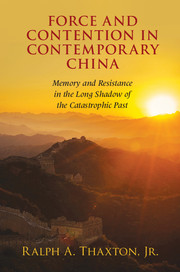 Force and Contention in Contemporary China
Force and Contention in Contemporary China Book contents
- Frontmatter
- Dedication
- Contents
- List of Illustrations
- Acknowledgments
- Cast of Characters for Da Fo Village and Several Other Villages in the Hebei-Shandong-Henan Border Area, 1945–2013
- Maps
- Introduction
- 1 The Violent Dawn of Reform
- 2 Contemporary Tax Resistance and the Memory of the Great Leap
- 3 Birth Planning and Popular Resistance
- 4 Rural Schools and the “Best Citizens of the State”: The Struggle for Knowledge and Empowerment in the Aftermath of the Great Leap
- 5 Official Corruption and Popular Contention in the Reform Era
- 6 The Rise of the Electricity Tigers: Monopoly, Corruption, and Memory
- 7 The Defeat of the Democratic Experiment and Its Consequences
- 8 Contentious Petitioners and the Revival of Mao-Era Repression
- 9 Migration and Contention in the Construction Sector
- 10 The Rise of the Martial Artists and the Two Faces of Mafia
- Conclusion: Big Questions and Small Answers from Da Fo
- Bibliography
- Index
- Miscellaneous Endmatter
7 - The Defeat of the Democratic Experiment and Its Consequences
Published online by Cambridge University Press: 05 August 2016
- Frontmatter
- Dedication
- Contents
- List of Illustrations
- Acknowledgments
- Cast of Characters for Da Fo Village and Several Other Villages in the Hebei-Shandong-Henan Border Area, 1945–2013
- Maps
- Introduction
- 1 The Violent Dawn of Reform
- 2 Contemporary Tax Resistance and the Memory of the Great Leap
- 3 Birth Planning and Popular Resistance
- 4 Rural Schools and the “Best Citizens of the State”: The Struggle for Knowledge and Empowerment in the Aftermath of the Great Leap
- 5 Official Corruption and Popular Contention in the Reform Era
- 6 The Rise of the Electricity Tigers: Monopoly, Corruption, and Memory
- 7 The Defeat of the Democratic Experiment and Its Consequences
- 8 Contentious Petitioners and the Revival of Mao-Era Repression
- 9 Migration and Contention in the Construction Sector
- 10 The Rise of the Martial Artists and the Two Faces of Mafia
- Conclusion: Big Questions and Small Answers from Da Fo
- Bibliography
- Index
- Miscellaneous Endmatter
Summary
Facing a continuing legitimacy crisis in the deep countryside, on November 24, 1987, the Deng Xiaoping–led Central government passed the provisional Organic Law on Village Committees, which mandated the formation of new bodies of local government through democratic procedures in China's 900,000-plus villages. Subsequently, the Ministry of Civil Affairs (MCA) set out to promote the democratic elections of Village Committees, the purpose of which was to liberate villagers from the coercive rule of Mao-era vigilantism and, according to Kevin J. O'Brien and Lianjiang Li, to “rejuvenate village leadership by cleaning out incompetent, corrupt, and high-handed cadres, all for the purpose of consolidating the current regime.”
Working with local government leaders and assisted by both the Carter Center and the Ford Foundation, the MCA attempted to promote several rounds of free and fair village elections in rural China. Between 1988 and 1998, its cadres sought to protect the young experiment in electoral democracy by providing secret voting facilities and legal oversight over violations of electoral procedures. Their hopes buoyed by Beijing's professed support for Village Committees, Western observers concluded that China's rural people had become weighty actors in the local electoral process, benefiting from a reform that was making village leaders more responsive to a popular electorate. Some even claimed the Chinese Communist Party (CCP) had planted the institutional seeds of local freedom.
The problem with this view was that it was a view from above. It was not rooted in an understanding of how local Communist Party leaders shaped the democratic experiment as it unfolded day by day, election by election on the ground. It presumed that popular support for elections was nurtured primarily by reformers in Beijing and that local party branch leaders were capable of supporting the fundamental principles and procedures underlying electoral democracy. Neither of these assumptions turned out to be true in Da Fo village. Because Da Fo experimented with electoral democracy between 1988 and 1998, we can draw on its history to generate a worm's-eye view of why elections mattered to villagers, of how contentious the electoral process was, and of the very limited extent to which local party leaders were inclined to endorse core democratic ideas and procedures.
- Type
- Chapter
- Information
- Force and Contention in Contemporary ChinaMemory and Resistance in the Long Shadow of the Catastrophic Past, pp. 238 - 275Publisher: Cambridge University PressPrint publication year: 2016


